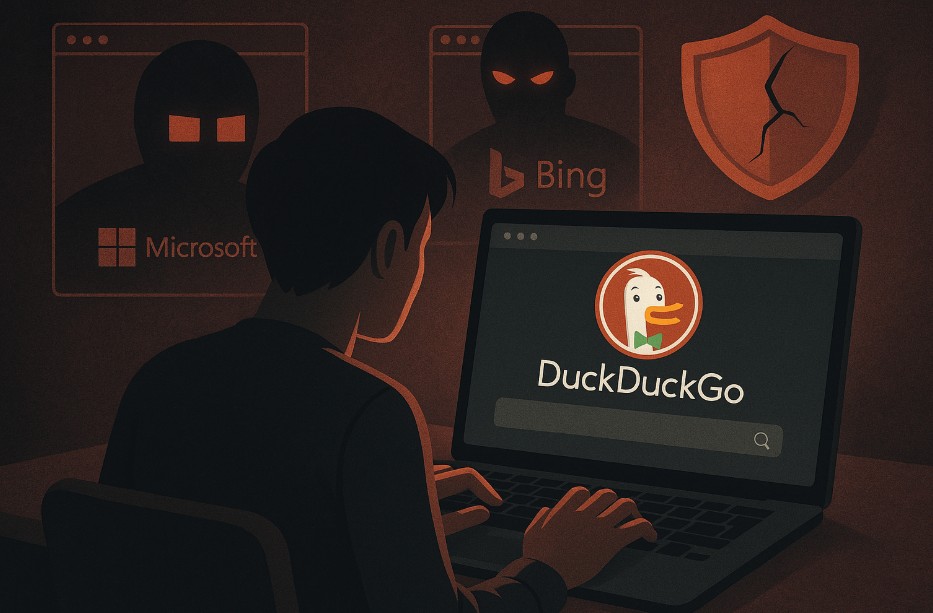Why DuckDuckGo Is Bad?: Risks, Limitations and Misconceptions Revealed
Why DuckDuckGo Is Bad?
DuckDuckGo has become one of the most recognised privacy-focused search engines on the web.
With over 100 million searches processed daily, it’s no surprise that many users believe it to be a secure and anonymous alternative to mainstream platforms like Google.
However, recent investigations, independent audits, and public disclosures have revealed that DuckDuckGo may not be as private or transparent as it claims.
Despite its slogan “we don’t track you,” DuckDuckGo has been at the centre of multiple controversies, most notably its hidden partnership with Microsoft, which permitted third-party tracking through its mobile browser.
These events have led to a growing sense of distrust among privacy-conscious users and have cast doubt on the platform’s ability to deliver on its core promise of anonymity.
How Did DuckDuckGo Become a Popular Privacy-Focused Search Engine?

DuckDuckGo was founded in 2008 with a mission to offer a search engine that did not collect or store user information.
The platform capitalised on growing concerns around data privacy and surveillance capitalism, positioning itself as a safer alternative to data-hungry companies like Google.
What made DuckDuckGo particularly appealing was its simple interface, lack of intrusive ads, and a clear privacy policy that claimed not to track user searches or create behavioural profiles.
Its popularity surged following major data scandals involving tech giants, which led many users to seek alternatives that prioritised privacy and anonymity.
Over the years, DuckDuckGo introduced its own browser and browser extensions, further establishing its identity as a privacy-first company. Yet, these offerings eventually revealed limitations that contradicted its foundational values.
Are DuckDuckGo’s Privacy Claims Really as Strong as They Seem?
The company’s bold claims have not withstood scrutiny.
In 2022, it was revealed that DuckDuckGo had entered into an agreement with Microsoft that allowed Microsoft’s tracking scripts to run on certain websites accessed through the DuckDuckGo browser.
Security researcher Zach Edwards discovered this breach while investigating DuckDuckGo’s mobile browser, finding that the platform blocked trackers from Google and Facebook but allowed Microsoft-owned scripts to run freely.
The CEO of DuckDuckGo, Gabriel Weinberg, later admitted that the contract with Microsoft prevented them from blocking certain scripts for “accounting purposes.”
This revelation sparked backlash across the privacy community and led to public criticism of DuckDuckGo’s lack of transparency.
Although the company eventually modified the agreement, the damage to its reputation was already done.
These findings raised fundamental questions about DuckDuckGo’s integrity and the feasibility of its privacy model. A platform cannot claim to be fully private if it is subject to contracts that allow third-party tracking.
How Does DuckDuckGo Compare to Google in Terms of Accuracy and Performance?

From a technical standpoint, DuckDuckGo’s performance as a search engine falls short when compared to giants like Google. One of the biggest reasons is its dependence on Microsoft Bing for search results.
This reliance means that DuckDuckGo does not have its own crawling and indexing infrastructure, which limits the depth and freshness of the results it provides.
Below is a comparative table highlighting the key differences:
| Feature | DuckDuckGo | |
| Search Index | Relies on Bing | Own advanced indexing systems |
| Personalised Results | No | Yes (based on user profiles) |
| Real-Time Search | Limited indexing speed | Near-instant indexing |
| Local Search Accuracy | Often poor in the UK | Highly refined |
| Search Result Quality | Basic relevance algorithms | Sophisticated AI-driven results |
| Image and Video Search | Limited filtering | Comprehensive filtering and depth |
| Integration with Services | Minimal | Extensive (Gmail, Maps, Calendar) |
DuckDuckGo’s lack of personalised results may benefit privacy, but it also means users receive less relevant answers, especially for location-based searches or time-sensitive queries.
For UK users seeking local information, this can significantly hinder the overall experience.
Is DuckDuckGo Truly Neutral, or Does It Filter and Censor Content?
DuckDuckGo promotes itself as a neutral search engine, but its reliance on Bing undermines this position. Since Bing provides the bulk of DuckDuckGo’s search data, it also inherits Bing’s algorithmic filters, blacklists, and biases.
There have been instances where politically sensitive or controversial content appeared suppressed, and unlike more transparent engines, DuckDuckGo does not provide clarity on its ranking algorithms.
Without independent verification or transparency reports, it becomes difficult to assess whether DuckDuckGo offers truly unbiased access to information.
Furthermore, the platform has no mechanism to appeal or dispute filtered content, leaving users in the dark about what might be missing from their search results.
What Are the Biggest User Experience Limitations of DuckDuckGo?

While DuckDuckGo is user-friendly on the surface, it suffers from several practical shortcomings. The interface is clean, but the functionality is often limited.
For instance, users cannot sync their settings across devices due to the absence of a login feature. Additionally, advanced search features such as voice search, map integration, and real-time news updates are either missing or underdeveloped.
The auto-complete system, which is designed to suggest queries in real time, has been shown to leak user input due to a flaw in how data packets are transmitted.
This undermines user privacy and leaves open the possibility of search data interception, particularly on unsecured networks.
These limitations make DuckDuckGo less suitable for power users or those requiring more complex, context-aware search functionality.
Is DuckDuckGo Really Free from Tracking and Surveillance?
Despite its claims, DuckDuckGo does not provide full anonymity. The search engine encrypts search data via HTTPS and does not store user profiles.
However, once a user clicks through to an external website, that protection ends. DuckDuckGo does not mask users’ IP addresses, and it does not block tracking scripts from the destination sites.
More concerning is that some search data remains visible in the browser URL. This means that anyone with access to the device including other apps, malware, or shared network administrators can potentially view what was searched.
Although DuckDuckGo uses POST requests for transmitting queries, local storage vulnerabilities still allow session data to persist even after cookies are cleared.
In addition, security researchers uncovered a uXSS (Universal Cross-site Scripting) vulnerability in DuckDuckGo’s Privacy Essentials feature.
This flaw could let attackers execute malicious code, monitor user activities, and even hijack accounts a serious issue for any platform that claims to be privacy-first.
What Misconceptions Do Users Have About Private Browsing and Anonymous Searching?

There is a widespread belief that using DuckDuckGo ensures total privacy online, but that’s only partially true. DuckDuckGo doesn’t track users the way Google does, but this does not mean users are invisible.
Private search is not the same as private browsing. DuckDuckGo only controls what happens during the search phase.
After clicking on a search result, the destination website can collect data, deploy trackers, and identify users through browser fingerprinting or IP logging.
Even with features like Global Privacy Control (GPC), DuckDuckGo cannot enforce how other websites handle user data. Users who do not pair the search engine with a VPN or privacy-centric browser remain vulnerable to data exposure.
Is DuckDuckGo a Safe Alternative or an Overhyped Search Option?
While DuckDuckGo has clear advantages over mainstream search engines, particularly in its approach to data collection, its effectiveness as a privacy tool is significantly overstated.
The platform fails to address modern threats like fingerprinting, encrypted DNS, or anonymisation of IP addresses.
Moreover, recent data breaches in 2024 have exceeded one billion compromised records globally, and platforms that offer partial protection like DuckDuckGo are increasingly inadequate in the face of advanced tracking and profiling techniques.
DuckDuckGo’s business model, which still relies on ad revenue through Microsoft partnerships, also raises questions about potential conflicts of interest between user privacy and corporate profit.
What Should Users Consider Before Choosing DuckDuckGo Over Other Engines?

Users considering DuckDuckGo should weigh the benefits against its clear shortcomings. While it offers a cleaner and less invasive search experience, the platform cannot guarantee full privacy without additional tools.
For better security, pairing DuckDuckGo with a reputable VPN and privacy-focused browser (such as Brave or Tor) is recommended.
Equally important is understanding that search engine privacy is only one part of a broader digital hygiene strategy.
Users must remain proactive by using antivirus software, regularly clearing data storage, and reviewing app permissions to reduce their digital footprint.
Below is a table comparing DuckDuckGo with other privacy-centred search tools:
| Feature | DuckDuckGo | Startpage | Brave Search |
| Own Search Index | No (uses Bing) | No (uses Google) | Yes |
| Full IP Anonymisation | No | Yes | Partial |
| Tracker Blocking | Some | Most | Full |
| Local Storage Vulnerability | Yes | No | No |
| VPN Integration | Optional | Optional | Optional |
FAQs About DuckDuckGo and Privacy-Based Search Engines
Is DuckDuckGo entirely anonymous?
No. While it avoids building user profiles, it does not anonymise IP addresses or block all third-party trackers.
What was the Microsoft tracking controversy?
In 2022, it was revealed that DuckDuckGo allowed Microsoft tracking scripts on partner websites, breaking its core privacy promise.
Can DuckDuckGo be used safely?
It can be part of a privacy strategy but should be combined with a VPN and privacy-first browser to be effective.
Does DuckDuckGo block fingerprinting?
No. Its defences against browser fingerprinting are weak and can be bypassed by sophisticated scripts.
Are there better alternatives?
Yes. Startpage and Brave Search provide greater transparency and enhanced privacy features.
Why do some users still support DuckDuckGo?
Many users appreciate the effort DuckDuckGo makes toward privacy, despite its limitations, and find it more trustworthy than mainstream search engines.
Should I stop using DuckDuckGo?
Not necessarily, but users should be aware of its limitations and take additional steps to secure their data.







